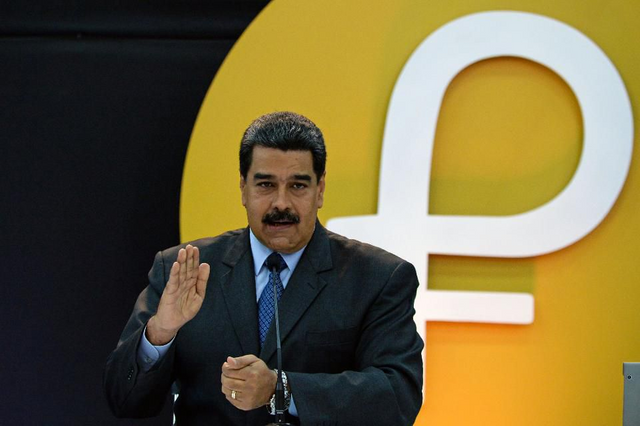Socialism seems to require a special kind of stupidity.
The president of Venezuela, Nicolás Maduro, during a press conference to launch a new cryptocurrency backed by oil called 'Petro'.
Take, for example, the last movement of Venezuela to face the ruinous hyperinflation of the country.
The country's president, Nicolás Maduro, earlier this month decided that the way to address the problem is to eliminate three zeros from the denominations of Bolívar currency, the country's money. For example, a 1,000 bolívares bill would become a 1 Bolívar bill, according to many press reports, including AP. The idea, says the AP, is to help (alleviate) a shortage of cash.
However, the shortage of cash will do nothing to solve the real problem underlying the need to have mountains of cash to buy things. What needs to be addressed is hyperinflation, which is now at a level below 8,000% annually in an oil-rich country, according to Steve Hanke, professor of applied economics at Johns Hopkins University. He tweets his latest estimates frequently.
A trill:
Prof. Steve Hanke Verified account @steve_hanke March 27 The annual inflation rate of Venezuela for today, 3/27/18, is 7895%
For most people it is difficult to understand how 7895% inflation can affect purchasing power. But consider the following.
If you have 100% inflation per year, then $ 1,000 will now have the same purchasing power as $ 500 a year ago. That result must be intuitively obvious, because as the price level doubles the spending power halves. Or in terms of cash, you would need twice as many invoices as before to make the same purchase.
But if you had $ 1,000 at the end of a year with an inflation of 7895%, you would buy approximately the same as $ 12.50 at the beginning of the year, according to a practical inflation calculator that I found on the web here. That is equivalent to approximately 1.25% of the remaining spending power, or a depreciation of more than 98%. In other words, cash quickly loses value. In terms of paper money, you would need almost 100 times more bills to pay previously.
And because the currency is increasingly useless, basic needs such as food and medical supplies can not be purchased. Why? Because few entrepreneurs want to offer these things for sale when the Bolivars depreciate quickly. You would not either.
If the currency were stable, then the supply of goods would appear. Zimbabwe, which suffered hyperinflation much worse than Venezuela about a decade ago, finally adopted the US dollar. UU Inflation quickly disappeared and many associated problems, such as shortages, were resolved.
It is difficult, if not impossible, to see how Maduro's plan to change the denominations in Bolívar's notes will do anything to change the problem of hyperinflation. Think of it as similar to the rock musician in the parody movie "This is Spinal Tap": This is a spinal tap, which boasts that the band's speakers have a volume control that goes to 11 instead of 10. The way in which the band member tells the story is as if the speakers were better than the others because the controller has different numbers. The scene in the classic movie is super fun especially because of the idiocy of the band member.
What is not so funny is that Maduro is using the same faulty logic with Bolivar. Less zeros with the money will not mean that Venezuela's hyperinflation will be solved more than an 11 in the Spinal Tap sound control makes the speakers louder. It is a joke of the serious humanitarian crisis in Venezuela.
At the end of last year, I spoke at a conference on the subject of economics. Although it was not on the agenda, that did not stop someone in the audience from asking if the US. UU They would provide humanitarian aid to the victims of the crisis in Venezuela. I indicated that the problem could be solved in a jiffy if Maduro adopted the US dollar as the currency of the country, as many other oil-rich nations have done, such as some of the countries in the Middle East.
And there is the problem, there is a solution available but the country's leadership does not want it.
Simon Constable is a writer, economics commentator and member of the Johns Hopkins Institute of Applied Economics, Global Health and the Study of Commercial enterprise.

